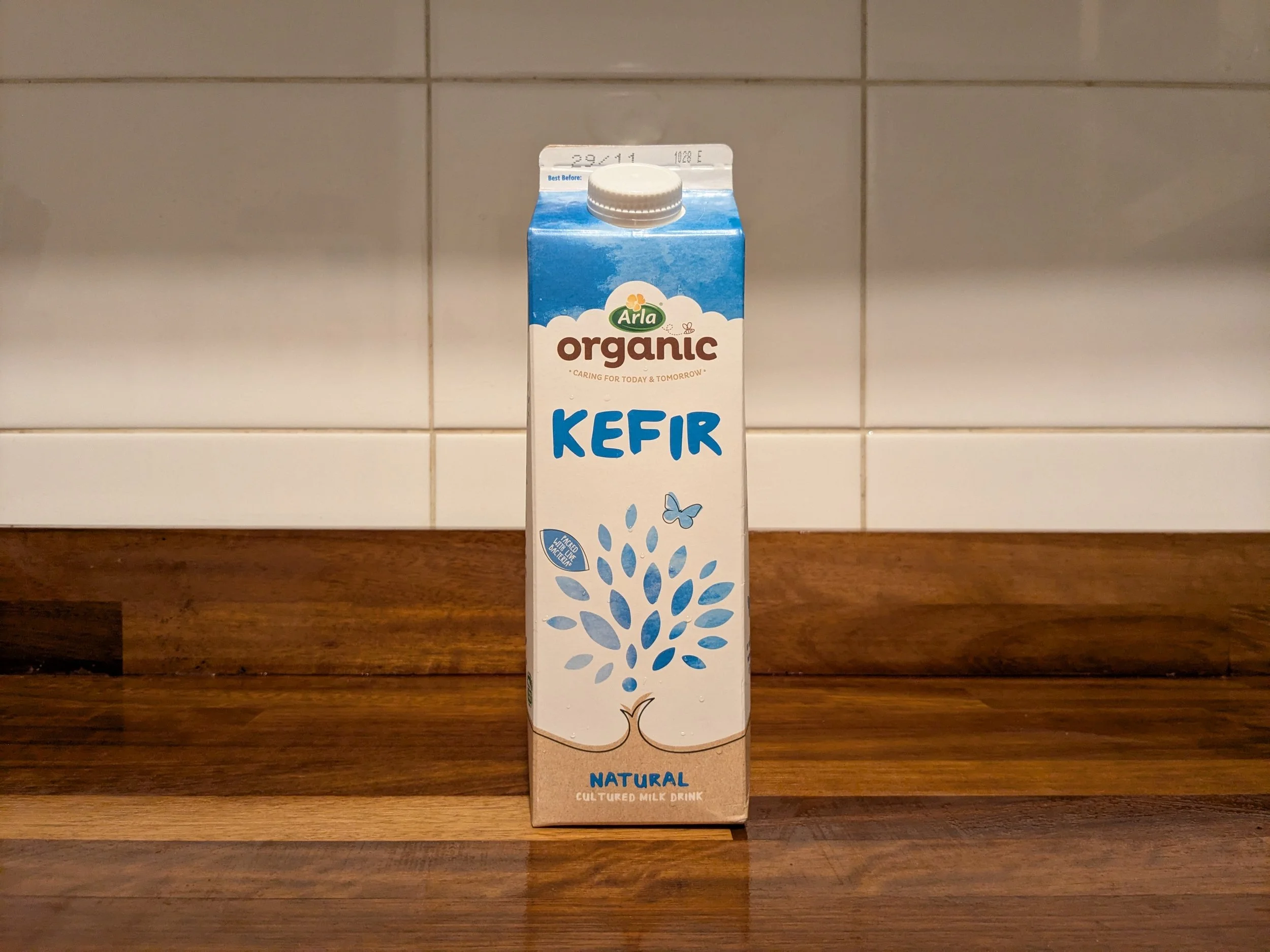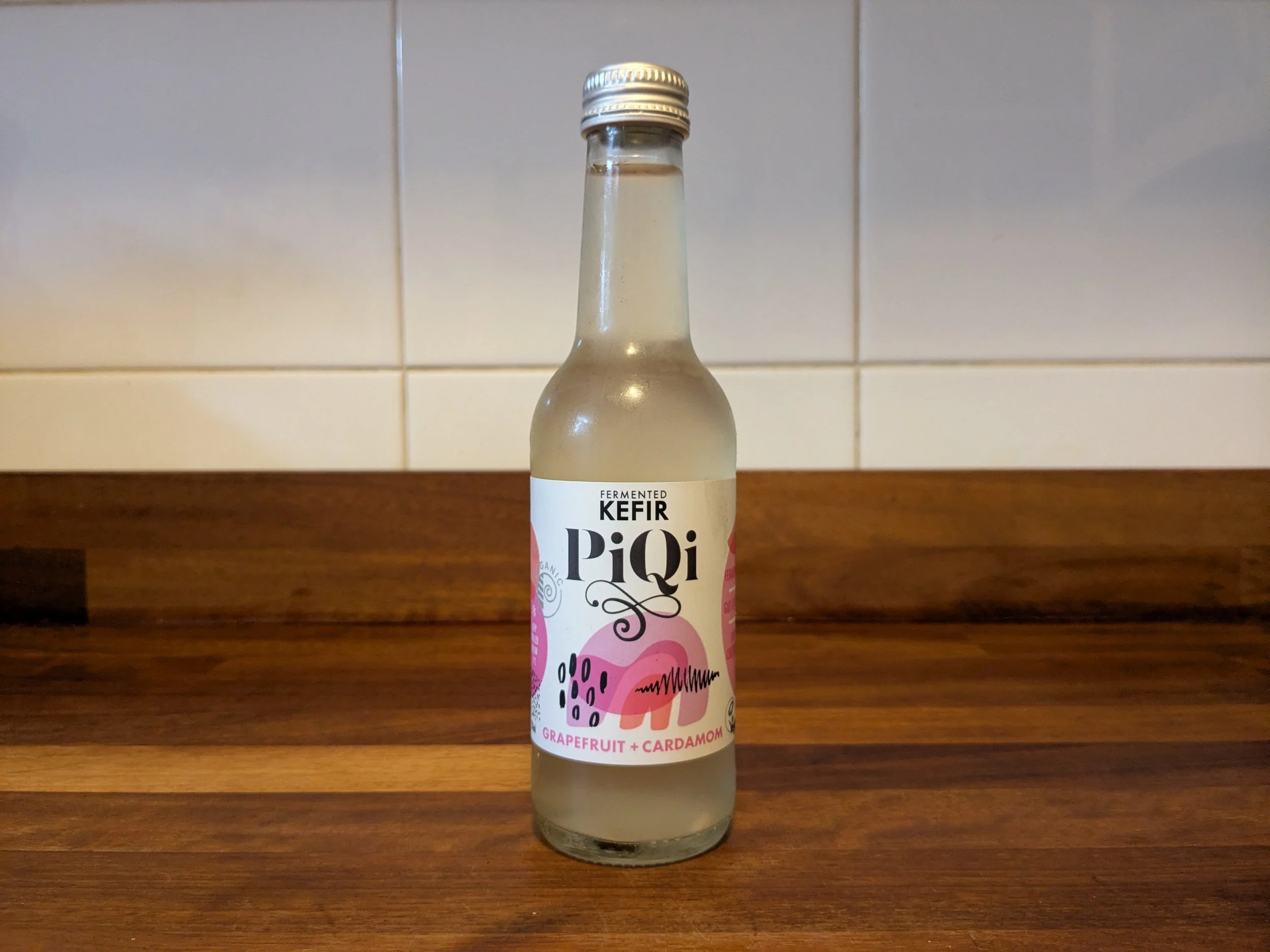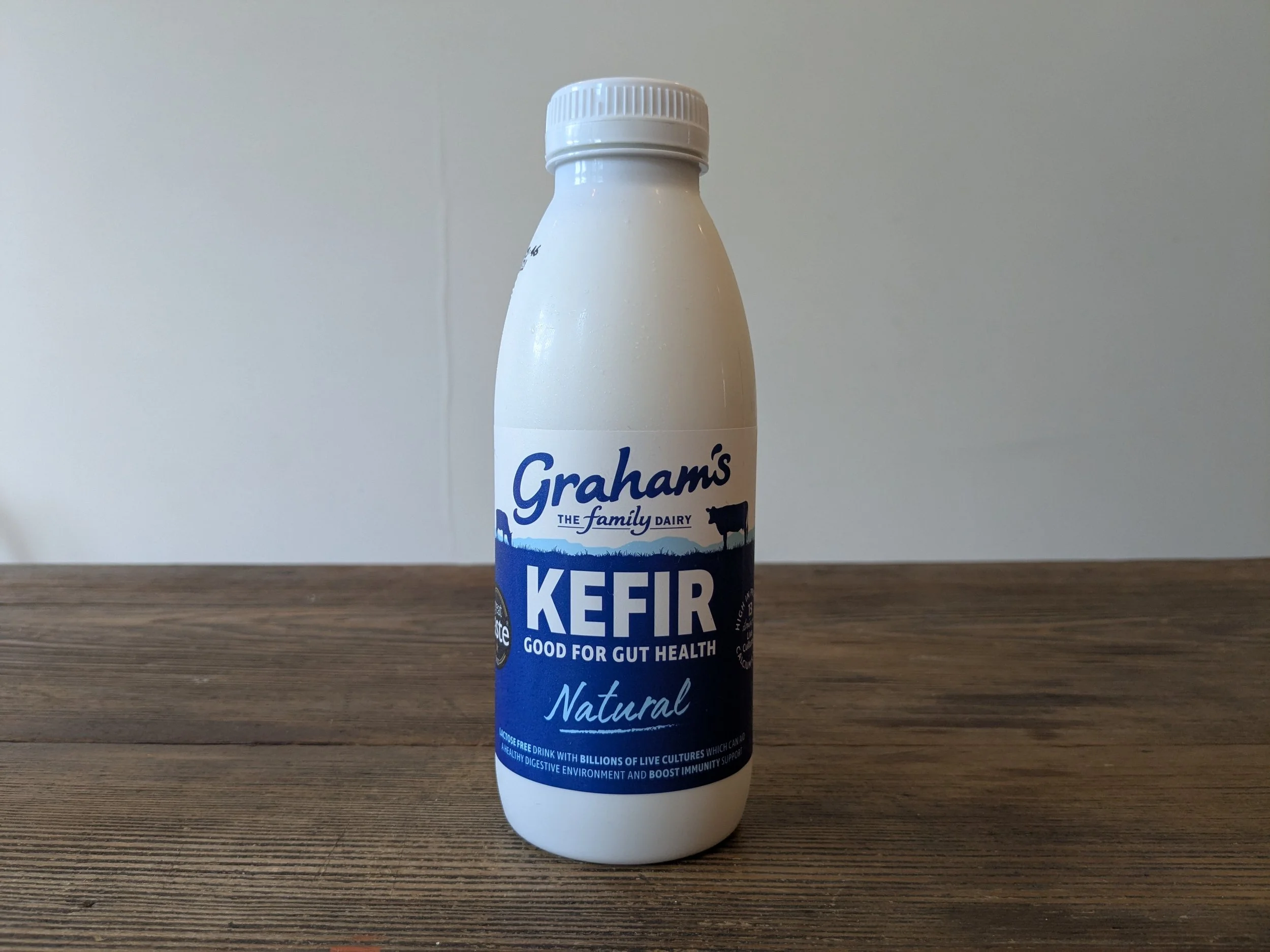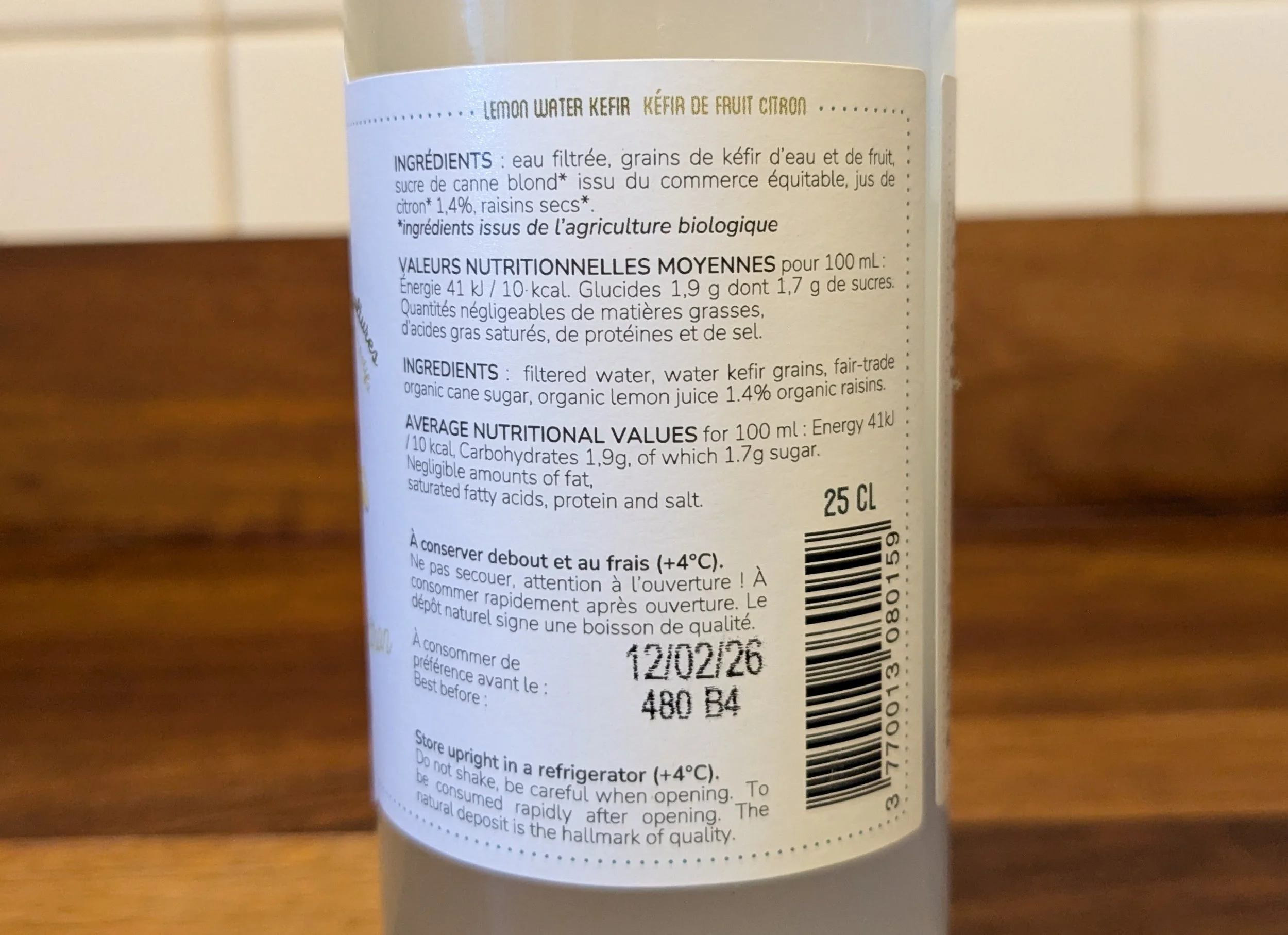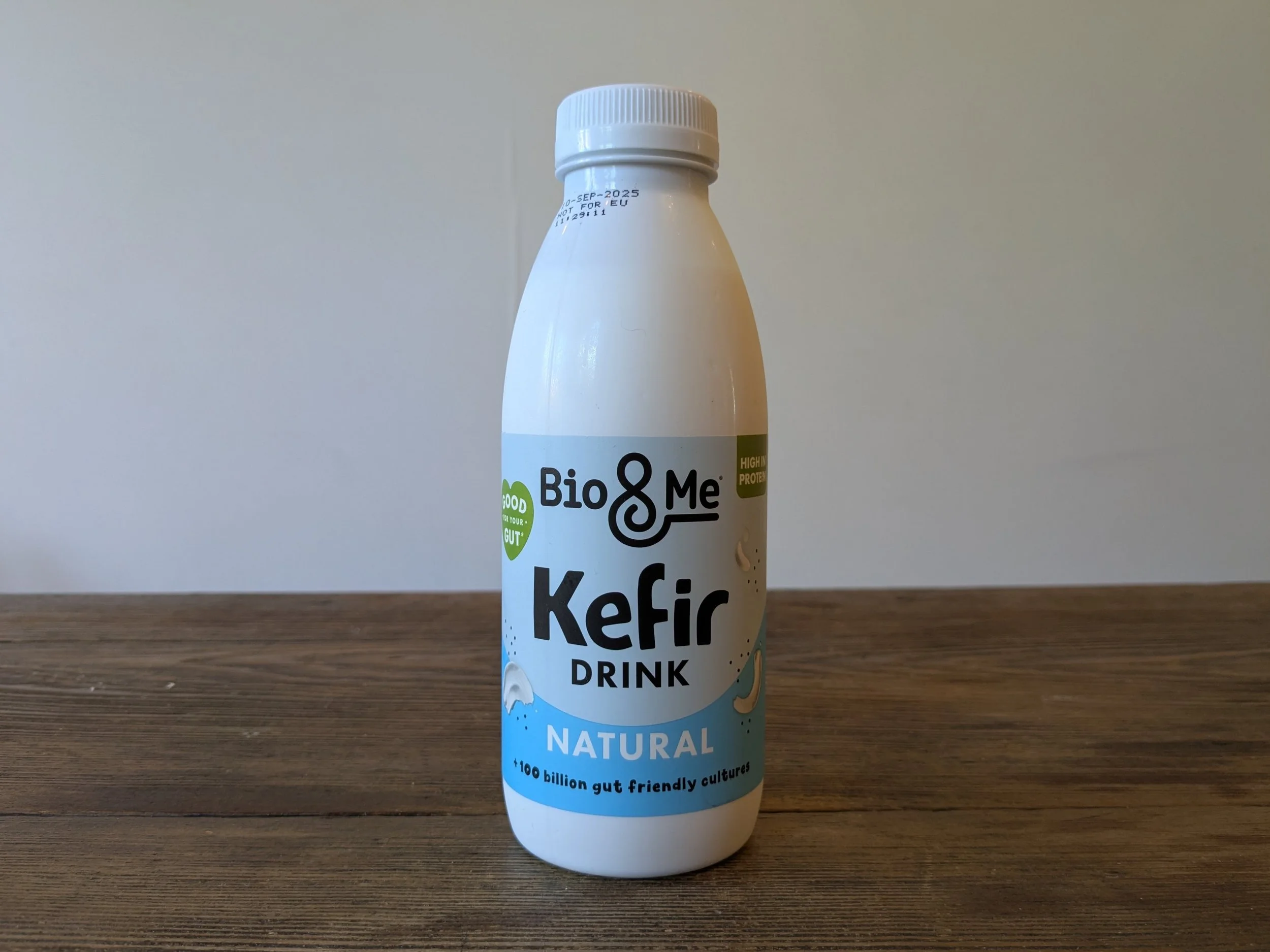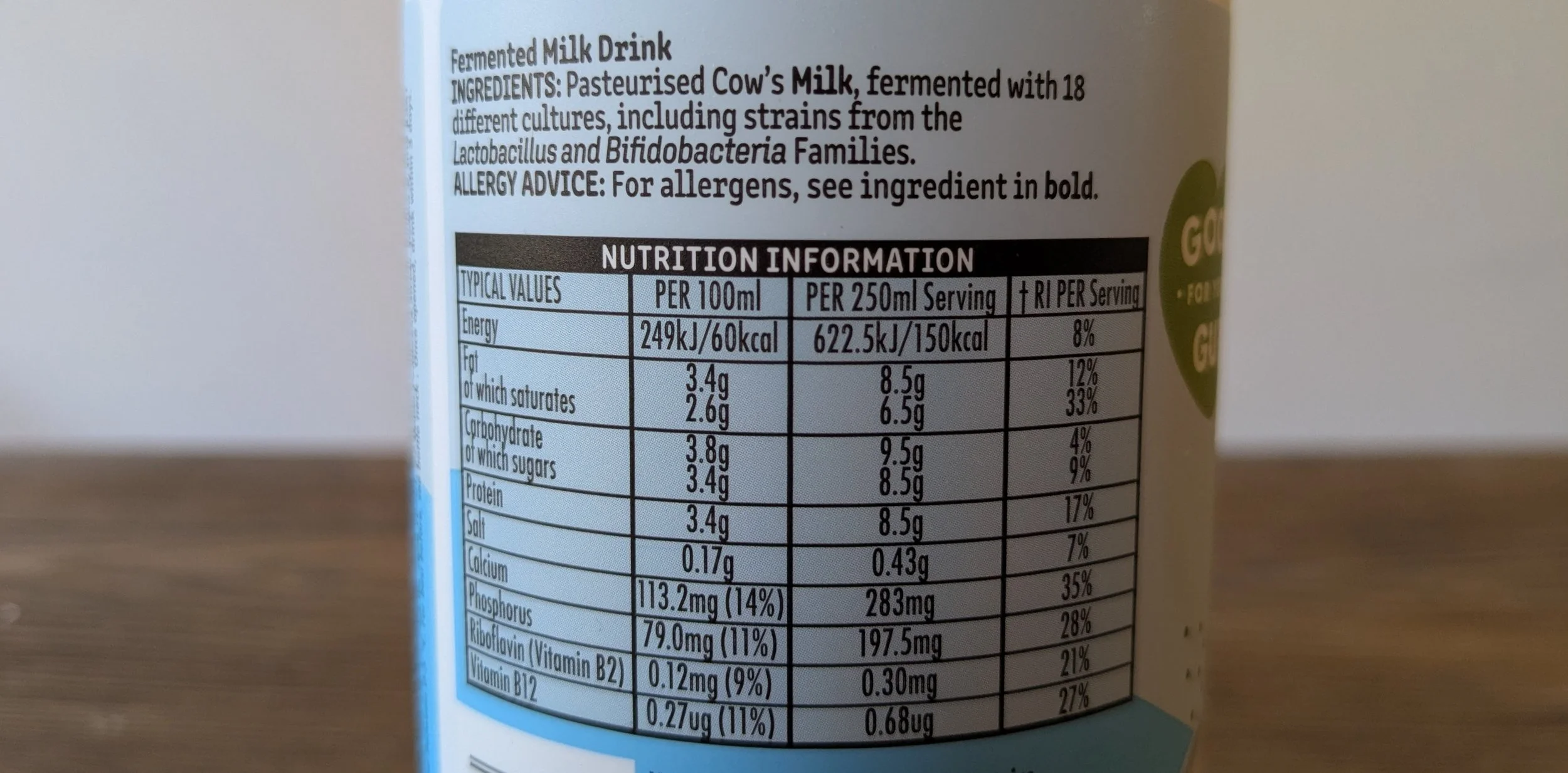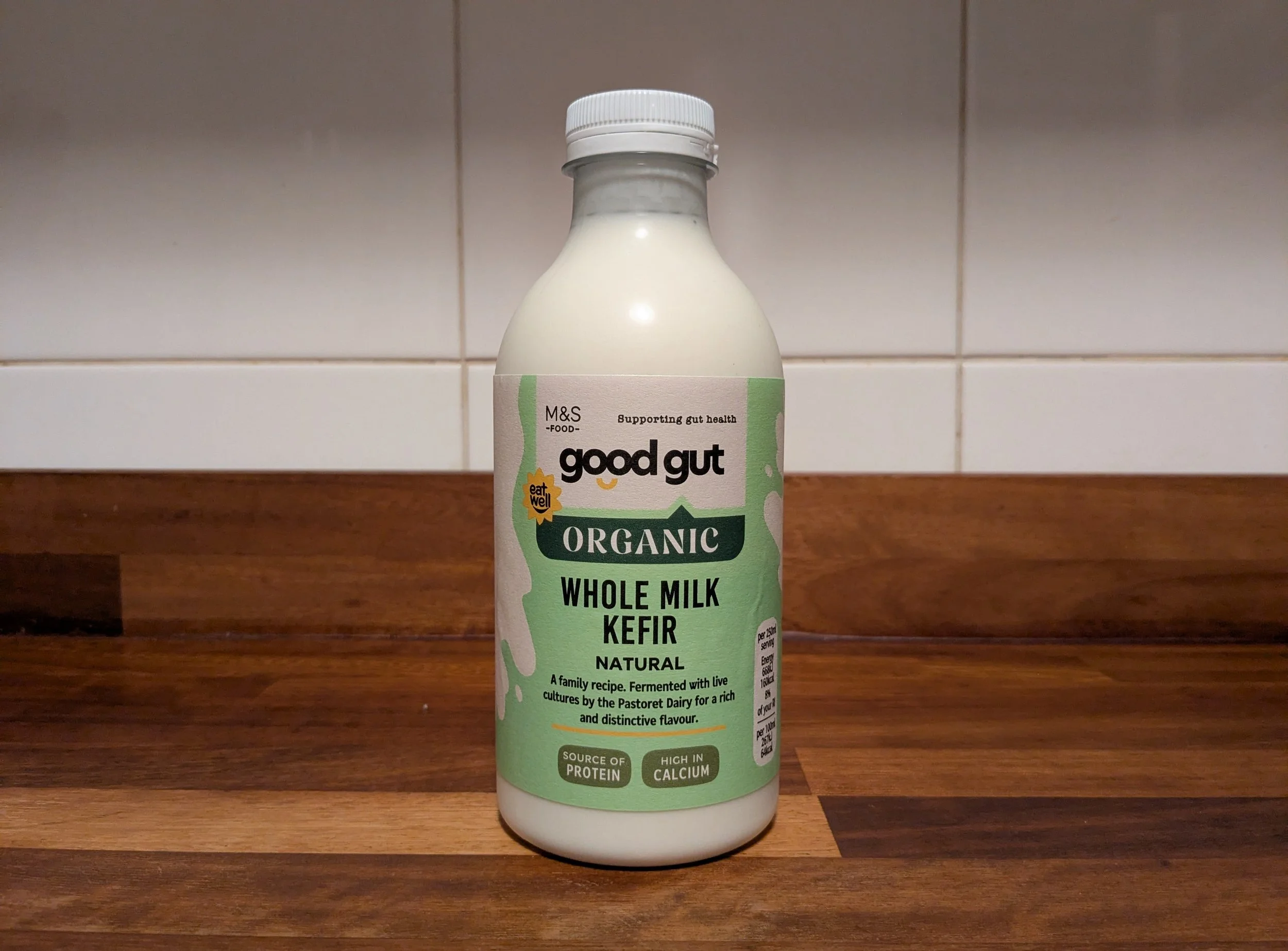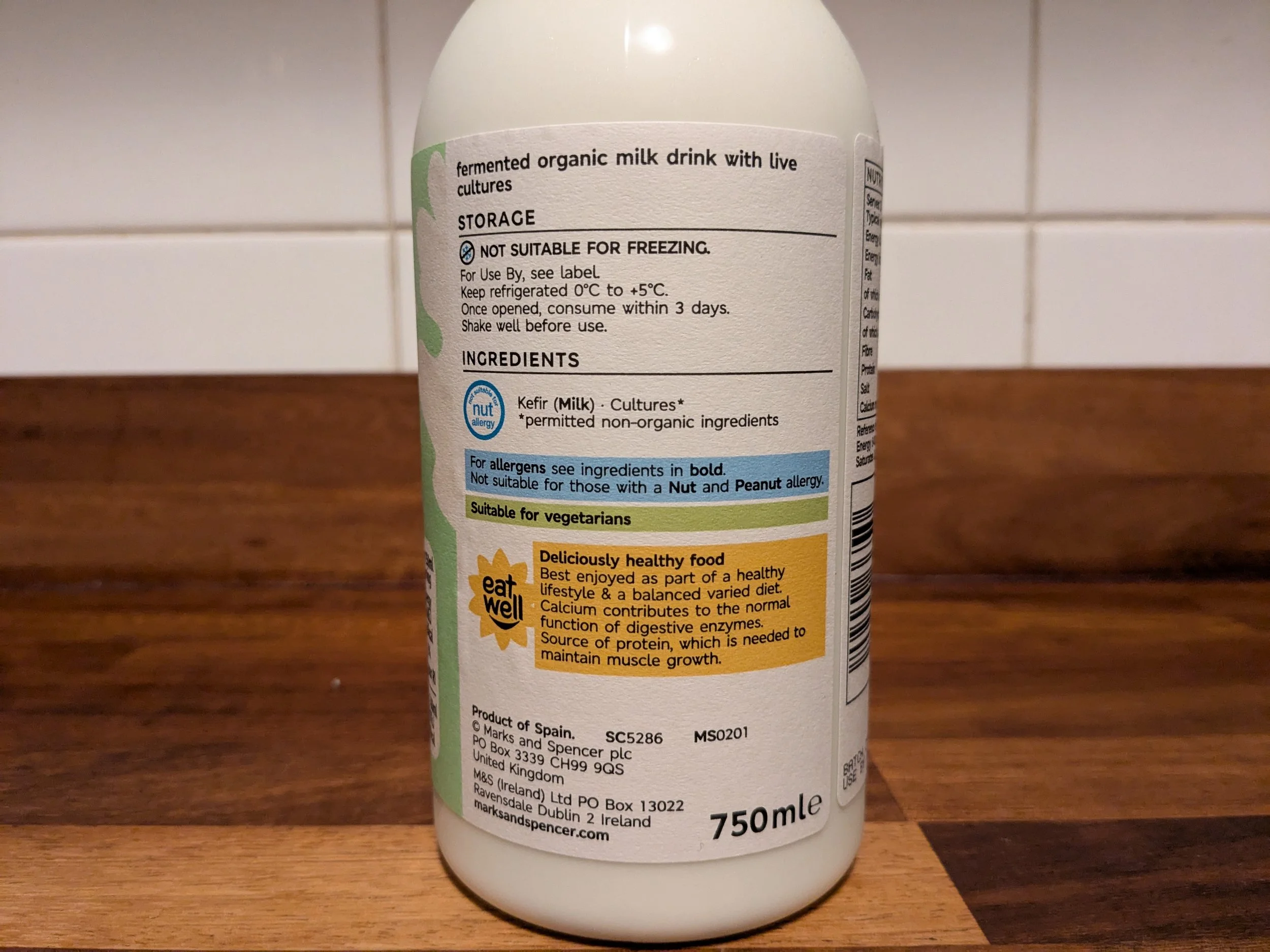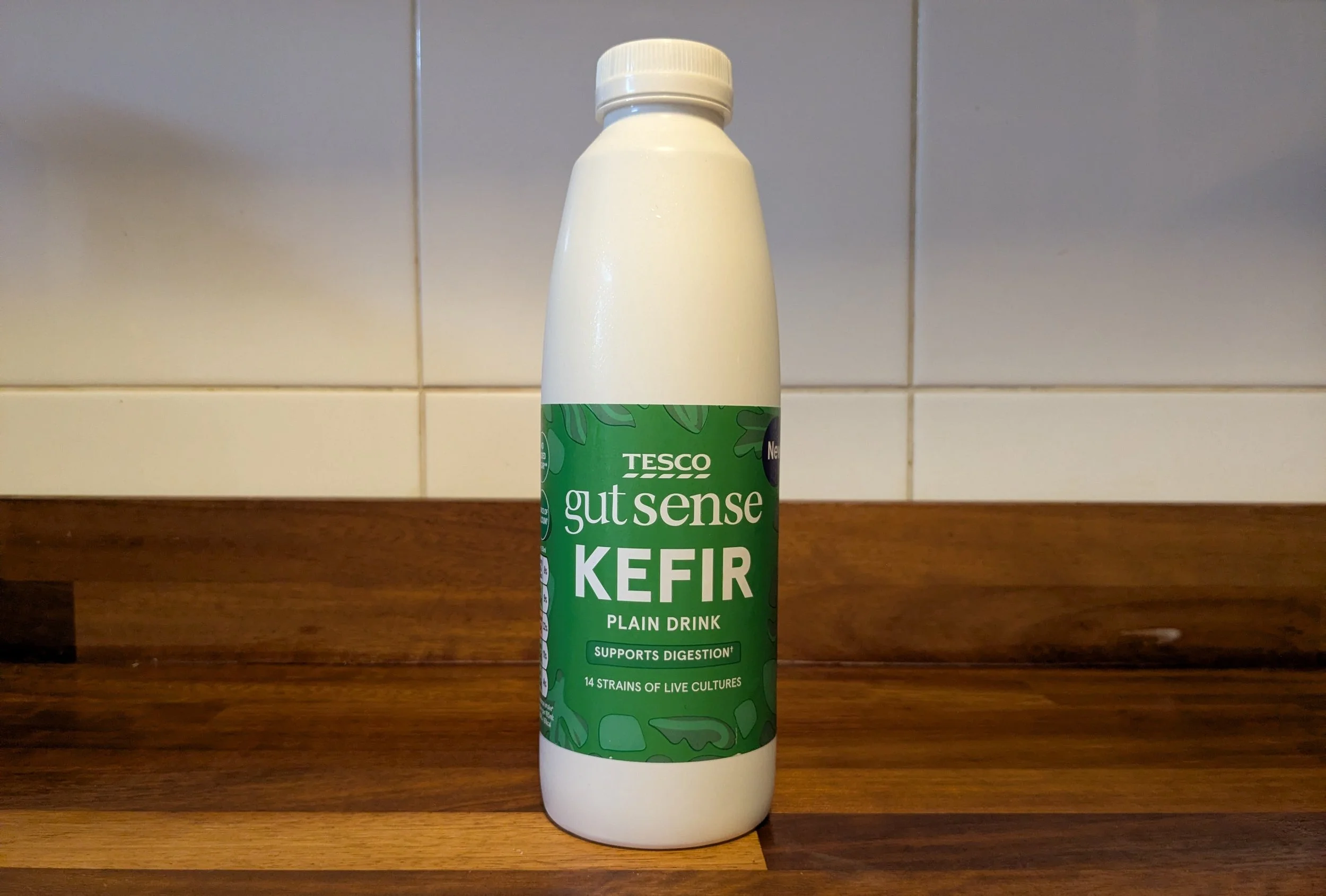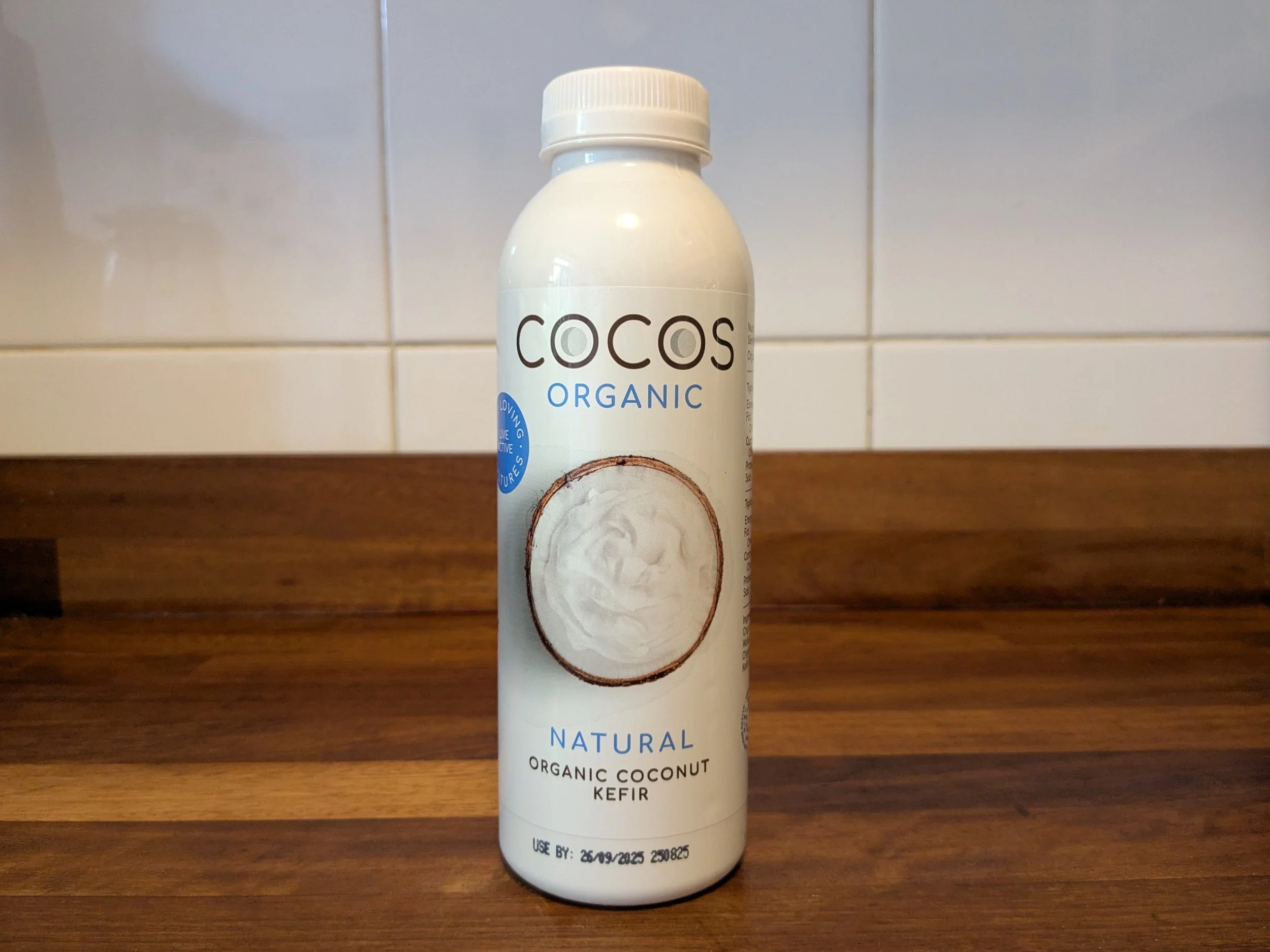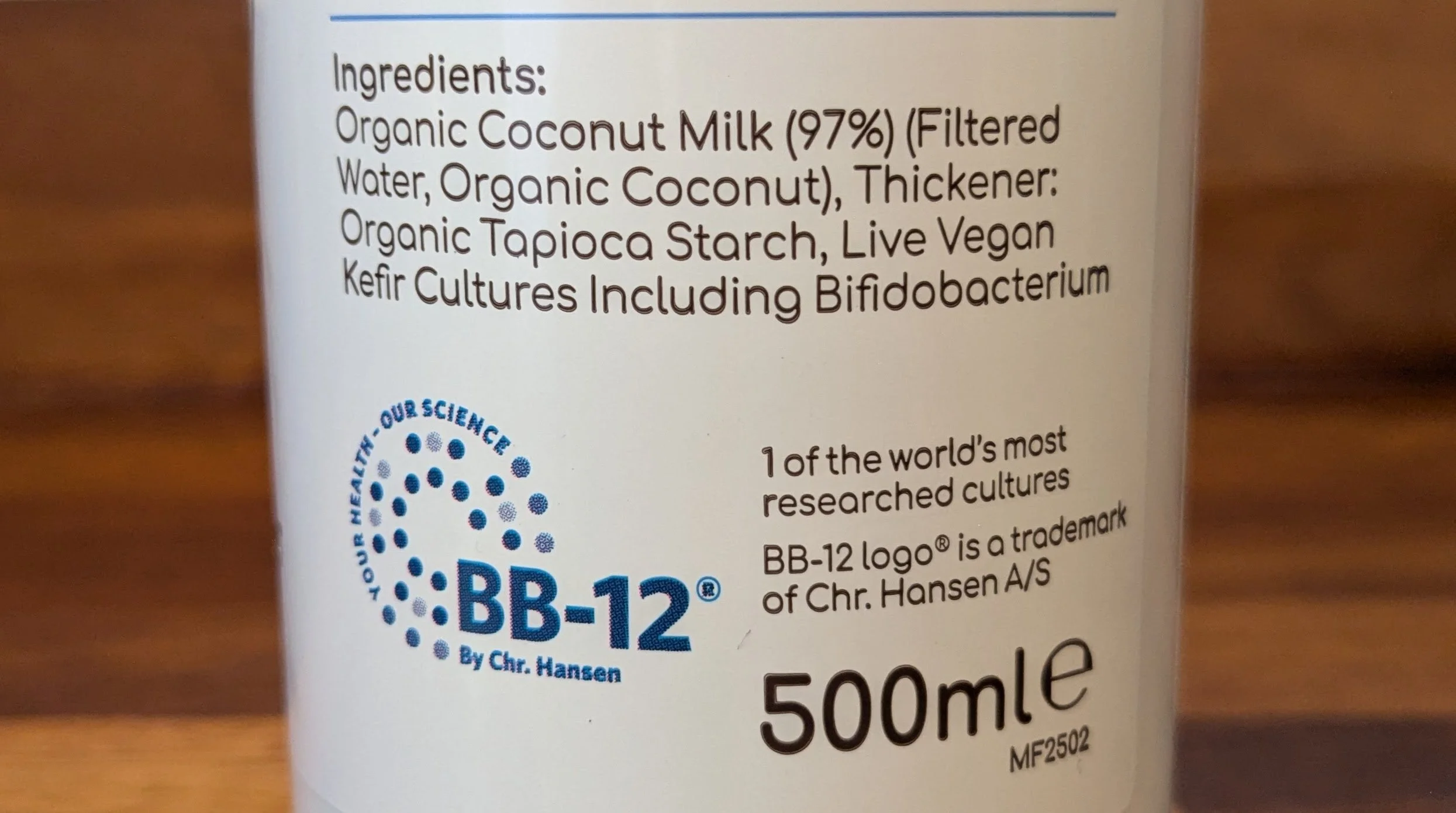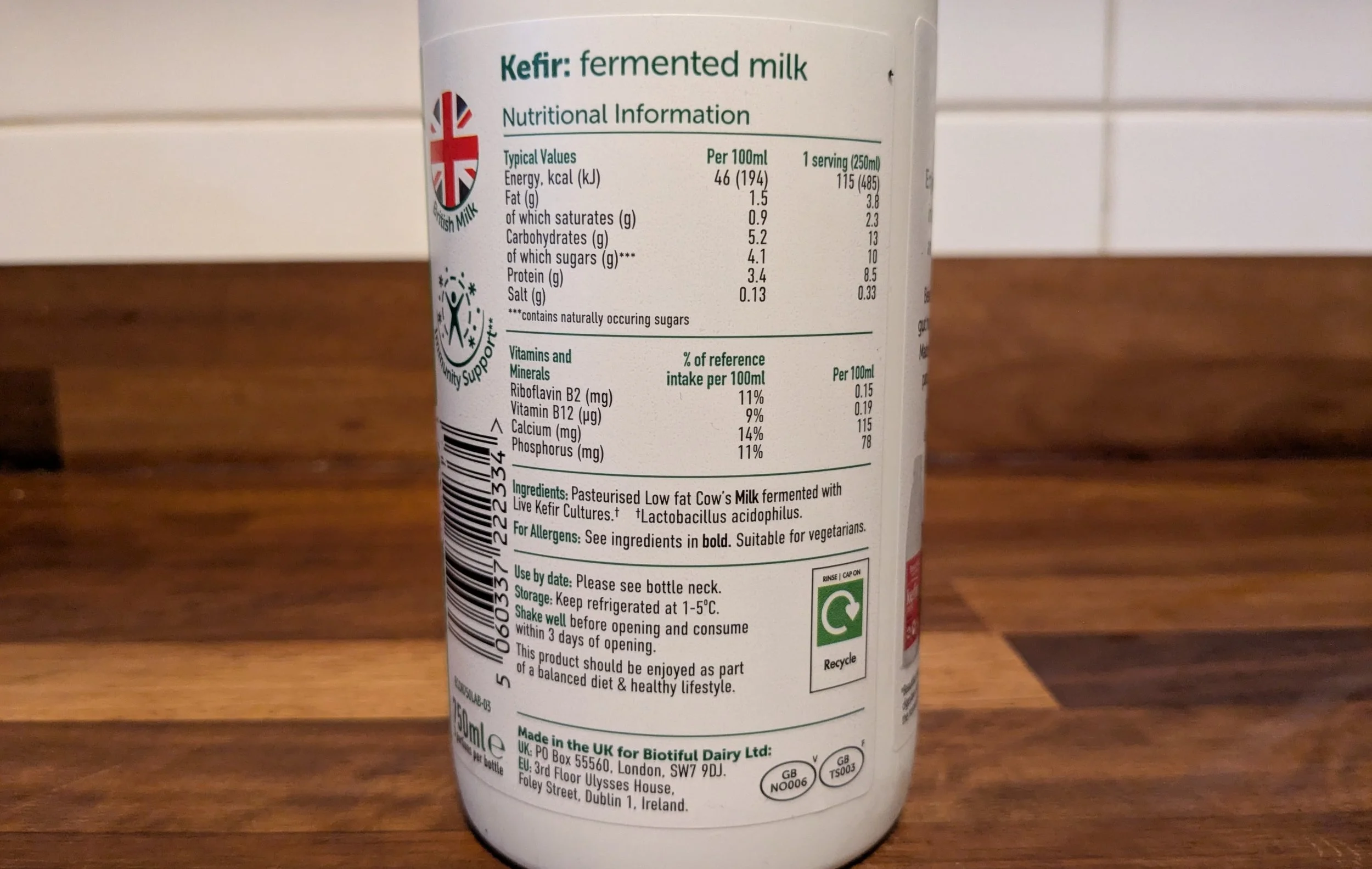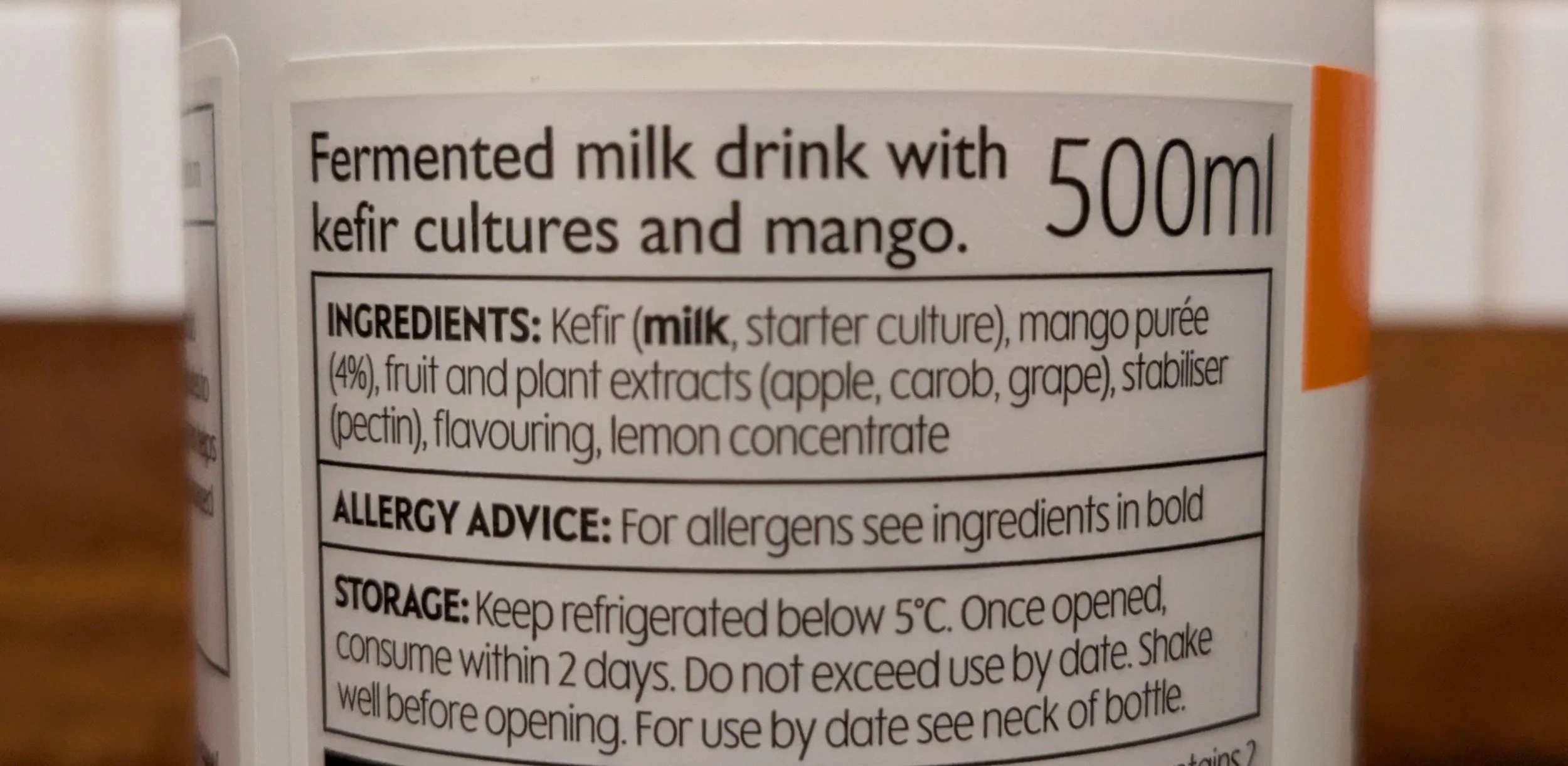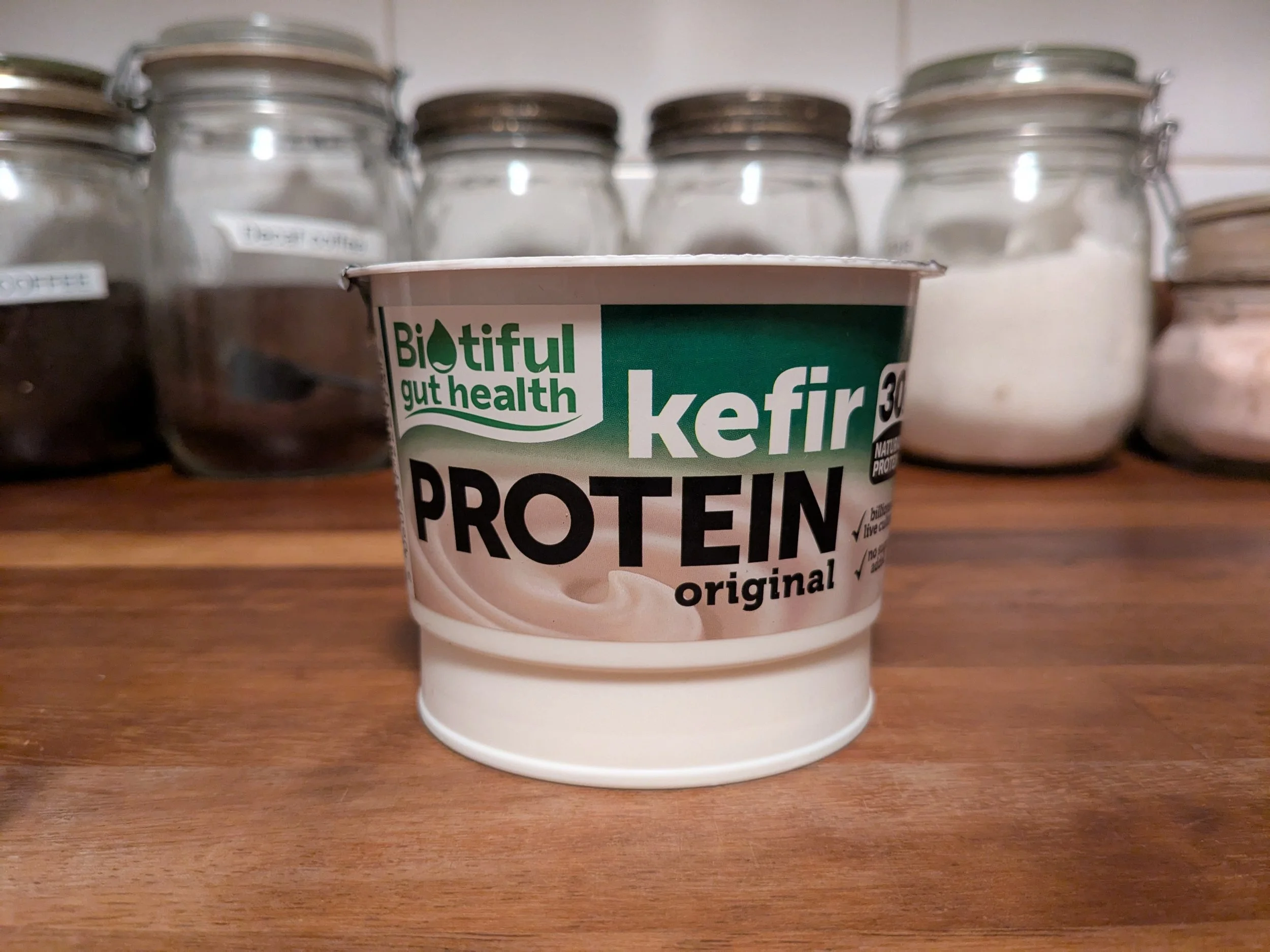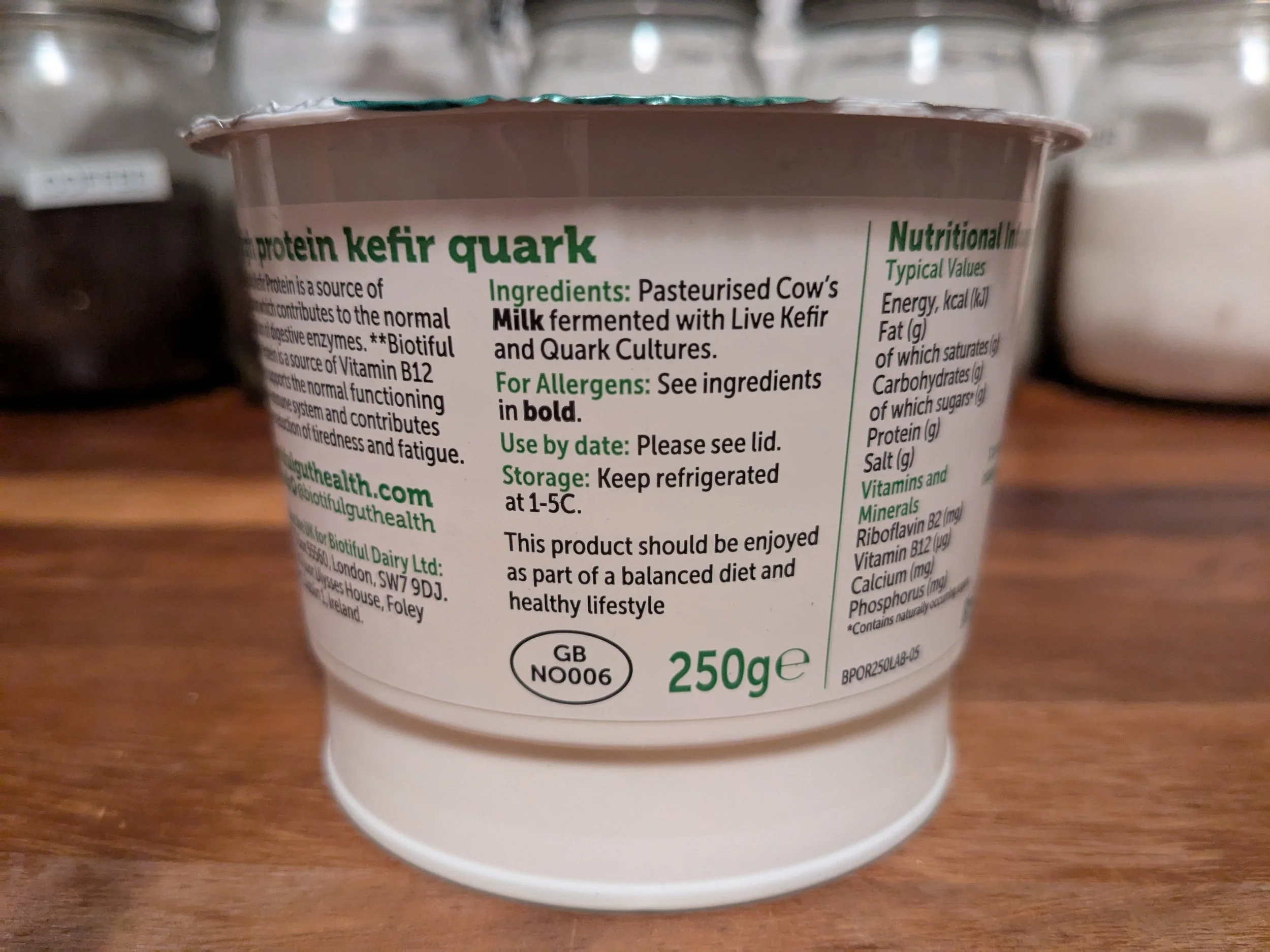Best kefir in the UK reviewed
Last updated: 04 December 2025
Here we will give a hands-on, taste-tested review of some of the UK’s best and most popular kefirs, including ones from M&S x Zoe, Biotiful, Danone Activia, Tesco Gut Sense, Arla, Waitrose, Bio & Me, Aldi Beautiful, Graham’s, M&S Good Gut, Biokef, Nourish goat milk kefir and Yeo Valley. We’ll also look at the vegan kefir, Cocos coconut kefir and water kefir from Piqi and Kefirade.
We’ll look into the benefits, ingredients, nutrition and flavour of these popular kefirs.
You might also be interested in reading our article on the best probiotics in the UK if you want to add more healthy microbes to your diet.
About kefir
When most people think of kefir, they’re referring to dairy kefir – a fermented milk drink traditionally made by adding kefir grains (clusters of bacteria and yeast living in natural symbiosis) to milk. The result is a tangy, drinkable dairy product similar to yoghurt but thinner in texture.
Because it’s fermented with a diverse community of microbes, dairy kefir has a distinctive flavour and texture that set it apart from yoghurt. It can be enjoyed on its own or added to cereal, smoothies or dressings. The fermentation process also breaks down much of the milk sugar, giving it a slightly lower lactose content than milk.
There’s also water kefir, made by fermenting a sugar-water solution with water kefir grains – a related but distinct culture from dairy grains. Water kefir is a sparkling, dairy-free drink often flavoured with fruit or herbs. Although it contains different species of bacteria and yeasts, it follows the same natural fermentation process as dairy kefir.
However, many commercial kefirs – both dairy and water – are not made with traditional grains. Instead, they’re produced by inoculating the liquid with a selected mix of bacterial and yeast strains. This simpler method creates a controlled, consistent product and is easier for manufacturers to scale, but it lacks some of the microbial diversity and complexity of true grain-fermented kefir.
Traditional kefir grains contain a shifting community of bacteria and yeasts, so the exact number and combination of strains vary from batch to batch and can’t be stated precisely on a label.
As a general rule, if a kefir is traditionally made it will mention ‘kefir grains’ on the label. And if a kefir states a precise number of strains, this suggests it has been inoculated with a defined starter blend rather than fermented with grains.
So it’s worth paying attention to how your kefir is made.
Read more about the benefits of kefir and how it differs to yoghurt.
Best kefir in the UK
M&S x ZOE gut shot kefir
M&S x ZOE gut shot kefir is the best kefir in the UK in our opinion.
This kefir is unique in that it comes in the form of a gut shot, rather than a 500ml bottle or similar. This means it doesn’t provide that value of others but its ingredients and benefits are superb.
This gut shot of kefir contains over 5 billion live cultures from 14 different strains.
It also contains ginger and lemon, as well as prebiotics to feed the good bacteria in your gut.
Flavour
The aroma is sweet banana and mixed fruit.
The taste is similar to yoghurt but with a slight vinegary, gingery acidic tang finish which lingers a bit. It also has an indistinct berry and mixed fruit taste with some banana coming through.
Typical of kefir, it is a bit funkier than yoghurt, with a finish that is not as clean. I would say the taste is still pleasant, but if it’s your first time drinking kefir then you will notice the difference initially.
Cost and availability
I bought it for just over £2 in a small M&S store. It is generally available in most M&S stores in my experience.
Summary
4.75 stars out of 5.
M&S x ZOE gut shot kefir has various live cultures, prebiotics, fruits, ginger and lemon. Although it is expensive on a per ml basis.
Pros
huge amount of live cultures
large diversity of bacterial strains
contains prebiotics
contains ginger and lemon
Cons
strong kefir takes a little getting used to initially
a small shot doesn’t provide the value of other kefir
Our favourite gut health products in the UK
YourBiology Gut+ probiotic not only offers 10 strains of probiotics, but also includes two types of prebiotics, three digestive enzymes and vitamin D for gut health support. All this means it offers a lot more benefits for gut health and general health than most probiotic supplements do
Healthpath gut health test is the UK’s most comprehensive gut health test. It tests over 100 biomarkers, checks your digestion and immune response, analyses leaky gut and provides a clear and understandable report on your microbiome
YourBiology SuperGreens+ is a superfood and greens supplement which makes it very easy to get a huge amount of nutrition - vitamins, minerals, amino acids, fibre, polyphenols and more - in one glass. Great for supporting gut health, skin health, energy, mental clarity and immunity.
Read more about the best gut health products in the UK.
Runner up kefir in the UK
Arla kefir
Arla kefir is a great all-round kefir which is traditionally made with kefir grains.
It is an organic kefir containing only milk and live cultures.
As mentioned, this kefir is made with kefir grains so it should have a broad community of live cultures in it. The label states it includes multiple cultures such as Lactobacillus acidophilus, Lactobacillus kefirgranum, Lactococcus lactis, Streptococcus thermophilus and Kluyveromyces marxianus. This is likely not an exhaustive list of the cultures it contains.
In terms of the actual amount of bacteria present (ie colony forming units), Arla gives no information.
It has moderate levels of protein (3.4%), fat (3%), sugar (3.9%) and calcium with 120mg per 100g.
Flavour
The texture is nice and thick without lumps. There’s also a fine effervescence.
The aroma is like a yoghurt with some farmhouse and funky cheese character. This is a sign that it has gone through a proper kefir grain fermentation.
Compared to the aroma, the taste is quite neutral and not as funky as I had expected. It’s quite a clean, fresh taste with some cream and savoury cheese characteristics. And the acidity is moderate.
Overall, the flavour is very good and strikes a good balance between traditional kefir flavour (ie funky and complex) and approachability.
Cost and availability
We bought a 1L bottle from Waitrose for £2.95.
Summary
Rating: 4.75 stars out of 5.
Verdict: Arla kefir is organic and is traditionally made with kefir grains. It has an approachable taste while maintaining some of the complex characteristics of traditional kefir. It also presents great value.
Pros
organic
simple ingredients
authentically made with kefir grains
great flavour
thick texture with fine effervescence
great value
good diversity of live cultures
Cons
no information on the actual number of live cultures present (ie colony forming unit count)
Read our full review of Arla kefir.
Best water kefir in the UK
Piqi water kefir
Piqi water kefir is a good choice for those looking for a non-dairy, more refreshing kefir.
This is an organic kefir with simple ingredients.
The specific ingredients are: kefir water (filtered water, cane sugar for fermentation, fig, water kefir culture), grapefruit, grapefruit juice and cardamom.
While the label doesn’t explicitly say it, their website confirms that this kefir is traditionally made with kefir grains - which means it should include a vast array of live cultures. However, Piqi gives no further information on the specific species.
In terms of the actual amount of live cultures present (usually expressed as colony forming units), no information is given again.
While dairy kefir typically has around 50-60 calories per 100ml, water kefir has only 13 calories per 100ml. This is similar to a midrange kombucha.
Flavour
The carbonation is very high and made me start burping almost immediately.
The aroma is very appealing with grapefruit and lime characteristics.
The taste is more delicate than you what you might expect - especially compared to other flavoured soft drinks or even kombucha. It has subtle notes of grapefruit and the cardamon dominates the finish. It also has the typical slightly stale aftertaste of traditionally made water kefir. Personally this taste makes it less refreshing than a kombucha. And the acidity is moderate.
Overall, the taste is subtle and interesting and you notice the stale character less as you drink more.
Cost and availability
We bought a 250ml bottle in an organic food store for £3.75.
Summary
Rating: 4.25 stars out of 5.
Verdict: Piqi water kefir is traditionally made with kefir grains. It has a delicate and interesting flavour (although the aftertaste is less appealing) but it is expensive.
Pros
authentically made with kefir grains - which means it should contain a broad spectrum of live cultures and postbiotics
organic
simple ingredients
low in calories
delicate, interesting flavour…
Cons
…but the slightly stale aftertaste typical of water kefir will bother some
no information on the strains of live cultures present
no information on the actual number of live cultures present (ie colony forming unit count)
expensive
Read our full review of Piqi water kefir.
Best value kefir in the UK
Graham's kefir
Graham’s kefir is a good choice for those looking for a fully lactose-free kefir or those wanting a good value kefir.
This is a fairly simple kefir which only includes milk, live cultures and lactase enzyme. It’s the added lactase which breaks down all the lactose in this drink.
Graham's kefir includes 13 strains of live cultures.
Unfortunately it gives no information on the actual amount of live cultures present (ie colony forming units).
It has moderate levels of protein (3.4%) and fat (3%), low to moderate levels of sugar (3.6%) and excellent levels of calcium with 295mg per 100g.
Flavour
The texture is a bit lacking and more on the thin, milky side for a kefir. It doesn’t have lumps like some kefir does and you can’t notice much effervescence.
The aroma is like yoghurt without any funky vibes kefir can have.
The taste is very clean and simple. It’s like a yoghurty acidic milk. And the acidity makes it quite refreshing.
Overall, the taste is good and certainly very approachable. But my only criticism is that it is a bit one dimensional and doesn’t have the complexity other kefirs have. However I could imagine a lot of people would appreciate this simple, more familiar taste.
Cost and availability
We bought a 500ml bottle from Lidl for £1.35.
Summary
Rating: 4.25 stars out of 5.
Verdict: Graham's kefir is a good value, lactose-free kefir with an approachable taste. Kefir aficionados may find this taste and its texture a bit underwhelming though.
Pros
14 stains of live cultures
excellent calcium levels
lactose free
cheap
approachable taste (if that’s what you’re looking for)…
Cons
…but the taste will be uninspiring to some who are more used to traditional kefir
more information on which live culture strains are included would be good
no information given on the actual amount of live cultures (ie colony forming units)
Other kefir in the UK
Yeo Valley kefir
This natural and unflavoured kefir only contains milk, and yoghurt and kefir cultures.
Yeo Valley kefir has an impressive 14 strains of bacteria in it. Unfortunately they don’t specify which strains these are or provide information on the actual amount of bacteria present (ie colony forming units).
This kefir is also a good source of:
calcium
protein - it is 4% protein
phosphorus
vitamin B2
Flavour
Being unflavoured, the natural kefir taste really shines.
The aroma is very similar to that of yoghurt - slightly acidic and milky.
The taste is quite similar to yoghurt also and doesn’t have the funky notes which some kefirs do. There’s not too much else to say about the taste; essentially it is a nice, refreshing and slightly acidic milky drink which is very approachable.
Cost and availability
I bought a 500ml bottle from a big Sainsbury’s for £2.25 (or £1.75 with a Nectar card).
Summary
4.5 stars out of 5.
A natural, organic kefir with good microbial diversity and great taste for a reasonable price.
Pros
natural and organic
14 strains of bacteria
refreshing taste
very approachable to people new to kefir
Cons
lacks information on which live culture strains are present
needs more information on the actual amount of bacteria present (ie colony forming units)
Kefirade water kefir
Kefirade is another good quality water kefir.
This is an organic kefir with simple ingredients.
The specific ingredients are: filtered water, water kefir grains, fair-trade organic cane sugar, organic lemon juice and organic raisins.
This kefir is traditionally made with kefir grains - which means it should include a vast array of live cultures. However, Kefirade gives no further information on the specific species.
In terms of the actual amount of live cultures present (usually expressed as colony forming units), no information is given again.
While dairy kefir typically has around 50-60 calories per 100ml, water kefir has only 10 calories per 100ml. This is similar to a midrange kombucha.
Flavour
It is moderately carbonated with fairly big bubbles which caused some burping.
It has a nice fresh lemon aroma.
The taste begins with a fairly subtle lemon freshness and then develops into the slightly stale, minerally, funky farmhouse character typical of water kefir. Both of these flavours remain in the aftertaste. And it has a moderate acidity.
Overall, the taste is subtle and it becomes more refreshing once your palate adjusts to the funky aspects of it.
Cost and availability
We bought a 250ml bottle in an organic food store for £3.59.
Summary
Rating: 4.25 stars out of 5.
Verdict: Kefirade water kefir is traditionally made with kefir grains. It has a subtle lemon flavour (alongside the typical funky notes of water kefir). It is expensive though.
Pros
authentically made with kefir grains - which means it should contain a broad spectrum of live cultures and postbiotics
organic
simple ingredients
low in calories
nice subtle lemon flavour…
Cons
…but the typical funky character of water kefir won’t suit everyone
no information on the strains of live cultures present
no information on the actual number of live cultures present (ie colony forming unit count)
expensive
Read our full review of Kefirade water kefir.
Biotiful kefir
Biotiful kefir includes milk, cherry puree, fruit extracts, pectin, lemon, natural flavourings and various cultures.
Biotiful lists various bacteria as being present such as Bifidobacterium, Lactobacillus acidophilus, Lactobacillus casei and Lactobacillus rhamnosus. It’s not possible to say exactly how many strains of Bifidobacterium are present as they only list the genus.
Unfortunately they don’t provide specific information on the actual amount of bacteria present (ie colony forming units). They only state there are ‘billions’ of bacteria.
This kefir is also a good source of:
calcium (which helps digestion)
protein - it is 3.3% protein
phosphorus
vitamins B2 and B12 (which supports immunity)
Flavour
The flavour is brilliant.
The aroma is like a cherry yoghurt - with none of the funky vibes you can get with kefir.
The taste is fruity with cherry being dominant. Interestingly I would say it tastes more like a clean yoghurt than a kefir given the absence of any kefir funky flavours. This may make it appealing to a lot of people and it certainly makes it very approachable.
Cost and availability
I bought a 500ml bottle from a small Coop for £2.85.
Summary
4.25 stars out of 5.
Biotiful kefir is a delicious kefir which is more akin to yoghurt in taste.
Pros
clean ingredients (but not organic)
great cherry taste
very approachable, clean flavour
Cons
more specifics on the number of bacterial strains present would be helpful
needs more information on the actual number of bacteria present (ie colony forming unit count)
not the cheapest
Our favourite gut health products in the UK
YourBiology Gut+ probiotic not only offers 10 strains of probiotics, but also includes two types of prebiotics, three digestive enzymes and vitamin D for gut health support. All this means it offers a lot more benefits for gut health and general health than most probiotic supplements do
Healthpath gut health test is the UK’s most comprehensive gut health test. It tests over 100 biomarkers, checks your digestion and immune response, analyses leaky gut and provides a clear and understandable report on your microbiome
YourBiology SuperGreens+ is a superfood and greens supplement which makes it very easy to get a huge amount of nutrition - vitamins, minerals, amino acids, fibre, polyphenols and more - in one glass. Great for supporting gut health, skin health, energy, mental clarity and immunity.
Read more about the best gut health products in the UK.
Bio & Me kefir
Bio & Me kefir offers good bacterial diversity and a clean, approachable taste.
This is a simple and natural kefir which only contains cow’s milk and live cultures.
Bio & Me kefir includes 18 strains of live cultures. However, they only state that these are from the ‘Lactobacillus and Bifidobacteria families’.
In terms of the actual amount of bacteria present (usually expressed as colony forming units), Bio & Me state there are ‘100 billion gut friendly cultures’ - which presumably means there is that many in the whole bottle (rather than per serving or per 100ml).
It has moderate levels of protein (3.4%) and fat (3.4%), low to moderate levels of sugar (3.4%) and moderate levels of calcium with 113mg per 100g.
Flavour
The texture is fairly thick and nice to drink. It doesn’t have lumps or much effervescence which you can often find in traditional kefir.
The aroma is simply of yoghurt without any funky notes kefir can have.
The taste is very simple, clean and basically of a yoghurty milk. The acidity is at a moderate level.
Overall, the taste is refreshing and approachable. Similar to Graham’s kefir, if I were to nitpick I’d say the flavour is a bit one dimensional and lacks the complexity other kefirs have. But many may prefer the clean, milky yoghurt taste.
Cost and availability
You can buy a 500ml bottle from Tesco or Sainsbury’s for £2.60.
Summary
Rating: 4.25 stars out of 5.
Verdict: Bio & Me kefir is a simple kefir with good bacterial diversity and an approachable taste.
Pros
simple, natural ingredients
18 stains of live cultures
low in sugar
clean, approachable taste (if that’s what you’re looking for)…
Cons
…but the taste will be uninspiring to some who are more used to traditional kefir
lacks information on which live culture strains are included
on the more expensive end of the spectrum
M&S Good Gut kefir
M&S Good Gut kefir is among the few kefir reviewed here which actually tastes like a traditional kefir.
This organic kefir has very simple and traditional ingredients - only milk and live cultures.
Unfortunately M&S Good Gut kefir gives no information on how many or which types of live cultures are included.
However, the taste suggests this has a undergone a proper, traditional kefir fermentation with an array of bacteria and yeasts.
It also gives no information on the actual amount of live cultures present (ie colony forming units).
It has moderate levels of protein (3.1%), high levels of fat (3.9%), moderate levels of sugar (4.1%) and moderate levels of calcium with 126mg per 100g.
Flavour
The texture is quite runny for a kefir and doesn’t have lumps like traditional kefir can. And it has a low to moderate effervescence.
The aroma has the traditional kefir notes of farmyard funk. While some won’t find this initially appealing, it’s at least a sign that this is a proper kefir.
The taste is also a bit funky, but not to the level of the aroma. Other than the funk, it’s a bit like a watery yoghurt. There’s also a boozy characteristic to it - perhaps from the traditional fermentation with yeast as well as bacteria.
Overall, the taste is fine - but the texture is a bit underwhelming. However, compared to a lot of commercial kefir in the UK this at least comes across as a proper, traditional kefir. Many other kefir in the UK taste more like drinking yoghurts which don’t seem to have gone through complex kefir fermentation which produces a more complex, funky flavour.
Cost and availability
You can buy a 750ml bottle from M&S for £4.25.
Summary
Rating: 4 stars out of 5.
Verdict: M&S Good Gut kefir has the character of a traditional kefir, but is a bit runny. It’s also on the more expensive end of the spectrum.
Pros
simple, organic ingredients
tastes like a traditional kefir - which is surprisingly uncommon for commercial kefir
Cons
texture is a bit runny
high in fat for a kefir
on the expensive side
no information on which types of live cultures are included
no information on the actual number of live cultures present (ie colony forming unit count)
Read our full review of M&S Good Gut kefir.
Our favourite gut health products in the UK
YourBiology Gut+ probiotic not only offers 10 strains of probiotics, but also includes two types of prebiotics, three digestive enzymes and vitamin D for gut health support. All this means it offers a lot more benefits for gut health and general health than most probiotic supplements do
Healthpath gut health test is the UK’s most comprehensive gut health test. It tests over 100 biomarkers, checks your digestion and immune response, analyses leaky gut and provides a clear and understandable report on your microbiome
YourBiology SuperGreens+ is a superfood and greens supplement which makes it very easy to get a huge amount of nutrition - vitamins, minerals, amino acids, fibre, polyphenols and more - in one glass. Great for supporting gut health, skin health, energy, mental clarity and immunity.
Read more about the best gut health products in the UK.
Danone Activia kefir
Danone Activia kefir is probably best thought of as a yoghurt-kefir hybrid drink.
It only includes skimmed milk, cream and live cultures.
The label states that this kefir is made with ‘authentic kefir grains and Activia’s live cultures’. And the ingredients list states it includes ‘live yogurt and kefir cultures, and yeasts’.
So it’s not quite a fully traditional kefir as it includes some inoculation of strains.
Also, it includes 16 strains of live cultures - which certainly isn’t bad for a commercial kefir - but you would expect many more than this if it were traditionally made only with kefir grains.
The label also states these strains include: Bifidobacterium lactis, Lactobacillus bulgaricus, Streptococcus thermophilus, Lactobacillus ssp., Lactococcus lactis and Lactobacillus rhamnosus. It’s worth nothing that most of these strains are more typical of yoghurt than kefir.
And it gives no information on the actual amount of live cultures present (ie colony forming units).
It has moderate levels of protein (3.3%), moderate levels of fat (3.3%), moderate levels of sugar (4.1%) and moderate levels of calcium with 119mg per 100g.
Flavour
The texture is moderately thick and it has a few noticeable lumps. There is no typical kefir effervescence to speak of though.
The aroma is mainly of yoghurt with perhaps the slightest bit of typical kefir funk.
The taste is fairly yoghurty neutral and again with just a little kefir complexity in the background. The acidity is moderate.
Overall, the taste is fine but, like a lot of commercial kefir, it comes across more as a drinking yoghurt than an authentic kefir.
Cost and availability
We bought a 280g (yes, gram) bottle from Tesco for £1.60.
Summary
Rating: 4 stars out of 5.
Verdict: Danone Activia kefir is made with both kefir grains and inoculation of yoghurt cultures. The mainly yoghurty flavour reflects this.
Pros
no concerning ingredients (even if some aren’t entirely traditional)
16 strains of live cultures
approachable yoghurty flavour…
Cons
…but it doesn’t taste like a traditional kefir
not a fully authentic kefir as it’s inoculated with various yoghurt strains
no information on the actual number of live cultures present (ie colony forming unit count)
more expensive than some other (smaller) brands on a per ml/g basis
Read our full review of Danone Activia kefir.
Tesco Gut Sense kefir
Tesco Gut Sense kefir is a decent choice if you want to get prebiotic fibre in your kefir.
It only includes milk, inulin and live cultures.
It has 14 strains of live cultures, however the exact strains aren’t specified.
Tesco also gives no information on the actual amount of live cultures present (ie colony forming units).
It has moderate levels of protein (3.6%), low to moderate levels of fat (2.5%), moderate levels of sugar (3.8%) and moderate levels of calcium with 132mg per 100g.
Flavour
The texture is moderately thick for a kefir and doesn’t have lumps like traditional kefir can. Some of this thickness can be attributed to the added inulin fibre. And it has a low level of effervescence - much lower than traditional kefir.
The aroma is very neutral and simply comes across as yoghurt.
The taste is also neutral and ultimately tastes like a drinking yoghurt, rather than a traditional kefir which has a slightly funky taste. And the acidity is moderate.
Overall, the taste is fine and very approachable - but it doesn’t come across as anything like a traditional kefir in terms of texture, effervescence, aroma or taste. This and the fact it states it is made with yoghurt and kefir cultures leads me to believe it isn’t made in the traditional way with kefir grains.
Cost and availability
You can buy a 750ml bottle from Tesco for £2.90.
Summary
Rating: 4 stars out of 5.
Verdict: Tesco Gut Sense kefir has 14 stains of live cultures and added prebiotic fibre. It has an approachable taste, but it doesn’t seem to be a kefir made in the traditional way.
Pros
no concerning ingredients
added prebiotic fibre
less fat than some other brands
approachable taste…
Cons
…but it doesn’t taste like a traditional kefir
no information on which types of live cultures are included
no information on the actual number of live cultures present (ie colony forming unit count)
Read our full review of Tesco Gut Sense kefir.
Biokef kefir
Biokef kefir is a nice tasting kefir, but its price will turn some people off.
This kefir has only organic ingredients. Because it is flavoured, it has more ingredients than traditional kefir.
The ingredients are pasteurised Jersey cow milk, blueberry purée (16%), live kefir cultures and honey (1.3%).
Unfortunately details of the production process and live cultures are scarce. The label only states that this kefir includes ‘live kefir cultures’ (without listing any specific strains) and doesn’t mention the use of kefir grains. This strongly suggests to me that it isn’t traditionally made with kefir grains, but rather it is inoculated with various strains.
Biokef gives no information on the actual amount of live cultures present (ie colony forming units).
It has moderate levels of protein (3%), low levels of fat (1.3%) and very high levels of sugar for a kefir (8.8%). Unfortunately they give no information on calcium content.
Flavour
The texture is very thick and doesn’t have lumps. There is nice light effervescence which typically comes from yeast cultures.
The aroma is mainly of blueberry with a bit of the vodka boozy character you often find in traditional kefir. (This is not a bad thing!)
The taste mirrors the aroma closely. There’s a nice blueberry taste with a background of subtle booziness. The honey isn’t obvious but you get the sweetness it brings. The acidity is low to moderate.
Overall, the taste is great and not as sweet as I had feared. While it’s likely not made traditionally with kefir grains, it at least has some character of traditional kefir with the effervescence and booziness.
Cost and availability
We bought a 250ml bottle from an organic food store in London for £4.20.
Summary
Rating: 4 stars out of 5.
Verdict: Biokef kefir is an organic, flavoured kefir with a great taste. It is very expensive though and needs more information on its live cultures.
Pros
organic ingredients
low in fat
great flavour
Cons
high in sugar
likely not made traditionally with kefir grains
no information on the types of live cultures present
no information on the actual number of live cultures present (ie colony forming unit count)
no information on calcium content
very expensive on a per ml basis
Read our full review of Biokef kefir.
Nourish goat milk kefir
Nourish goat milk kefir might be an okay choice if you want a kefir made of goat milk, but you better love the taste of goat…
It only includes goat milk and live cultures.
It is traditionally made with kefir grains so it should have a very broad community of live cultures in it. Read more on this in our full review.
Nourish unfortunately gives no information on the actual amount of live cultures present (ie colony forming units).
It has low to moderate levels of protein (2.8%), moderate levels of fat (3.3%) and low levels of sugar (3.1%). Unfortunately it doesn’t state its calcium content.
Flavour
The texture is very thin for a kefir. And it doesn’t have much effervescence.
The aroma is very complex and not super appealing. It’s very goaty and funky - and smells a little like vomit to be honest.
The taste is extremely goaty - think a strong goat cheese in liquid form. And the acidity is very high, almost puckering.
Overall, the taste is too extreme for me and most likely for a lot of people. I’ve had goat kefir before but nothing as strongly goaty as this.
Cost and availability
We bought a 500ml bottle in an organic food store for £5.09.
Summary
Rating: 3.5 stars out of 5.
Verdict: Nourish goat milk kefir is made in the traditional way with kefir grains. Unfortunately, the taste is quite extreme and will be too goaty for a lot of people.
Pros
authentically made with kefir grains - which should mean broad spectrum of live cultures and postbiotics
very simple ingredients
low in sugar
contains only A2 milk proteins
Cons
taste is extremely goaty and likely too strong for many people
no information on the actual number of live cultures present (ie colony forming unit count)
no information on its calcium content
expensive
Read our full review of Nourish goat milk kefir.
Cocos coconut kefir
Cocos coconut kefir might be an option if you are looking for a vegan kefir.
This is an organic kefir which includes coconut milk (97%) (filtered water, coconut), tapioca starch and live cultures.
Cocos states it includes ‘live vegan kefir cultures including Bifidobacterium’. However, the only strain they specify is the probiotic Bifidobacterium animalis subsp. lactis BB-12. This is a very extensively studied probiotic which has been shown to:
improve bowel regularity and stool consistency
support a balanced gut microbiota
enhance immune function by strengthening antibody responses and reducing the risk and duration of some respiratory and gastrointestinal infections
Unfortunately it gives no information on the actual amount of live cultures present (ie colony forming units).
It has very high levels of fat (6.5%), low levels of protein (1.6%) and very low levels of sugar (0.5%). Unfortunately it doesn’t state its calcium content - but this would be negligible given the ingredients.
Flavour
The texture is certainly thicker than coconut milk, given the added tapioca starch. But I find this generally gives it an grainy, unnatural thickness, rather than the creamy thickness of dairy kefir. And considering this kefir is high in fat, you might expect the creaminess to be higher - but this is common with coconut kefir.
The aroma is straight up coconut - just like a packet of flaked coconut.
The taste is really not much to speak of - just of coconut with a moderate acidity.
Overall, the taste is fine enough but underwhelming. The texture really is lacking compared to a dairy kefir.
Cost and availability
You can buy a 500ml bottle from Waitrose for £3.75.
Summary
Rating: 3 stars out of 5.
Verdict: Cocos coconut kefir is vegan kefir with an okay taste but underwhelming texture. Like other coconut kefir, the health factors in general don’t measure up well against dairy kefir.
Pros
vegan (if that is important to you)
organic, fairly simple ingredients
very low in sugar
Cons
very high in fat for a kefir
low protein levels
underwhelming texture
negligible calcium levels
needs more information on the strains of live cultures present (as they currently only specify one strain)
needs more information on the actual number of bacteria present (ie colony forming unit count)
Read our full review of Cocos coconut kefir.
Aldi Beautiful kefir
Aldi Beautiful kefir only includes one strain of live cultures so is it really a kefir?? I think it is more of a drinking yoghurt. More on this and who actually makes it in our full review.
The one strain of live cultures it includes is Lactobacillus acidophilus.
Unfortunately it gives no information on the actual amount of live cultures present (ie colony forming units). They only state there are ‘billions of live cultures’.
It has very simple, natural ingredients, just low fat cow’s milk and live cultures.
It has moderate levels of protein (3.4%), low levels of fat (1.5%), moderate levels of sugar (4.1%) and moderate levels of calcium with 115mg per 100g.
Flavour
The texture is low to moderately thick for a kefir. It doesn’t have lumps or much effervescence which you often find in traditional kefir.
The aroma is just like yoghurt without any funky notes kefir can have.
Similarly, the taste is just like a yoghurty milk. And there’s sort of watery aspect and lack of depth which might be due to the low fat milk used. The acidity is at a low to moderate level. And it doesn’t have the complex funky taste which traditional kefir does.
Overall, the taste is fine and certainly approachable. But again the question arises, is this really a kefir?? It doesn’t have the texture, aroma or taste of traditional kefir - which should not be surprising given it’s fermented with only one strain of live culture.
Cost and availability
You can buy a 750ml bottle from Aldi for £2.29.
Summary
Rating: 2.75 stars out of 5.
Verdict: Aldi Beautiful kefir is not made in the traditional way with a wide variety of live cultures so it is better thought of as a drinking yoghurt with a simple, clean taste.
Pros
simple, natural ingredients
low in fat
cheaper than others
Cons
the taste is clean and approachable but it lacks depth
doesn’t have the texture, aroma or taste of a traditional kefir
only one strain of live culture used (therefore is it really a kefir??)
needs more information on the actual number of bacteria present (ie colony forming unit count)
Read our full review of Aldi Beautiful kefir.
Our favourite gut health products in the UK
YourBiology Gut+ probiotic not only offers 10 strains of probiotics, but also includes two types of prebiotics, three digestive enzymes and vitamin D for gut health support. All this means it offers a lot more benefits for gut health and general health than most probiotic supplements do
Healthpath gut health test is the UK’s most comprehensive gut health test. It tests over 100 biomarkers, checks your digestion and immune response, analyses leaky gut and provides a clear and understandable report on your microbiome
YourBiology SuperGreens+ is a superfood and greens supplement which makes it very easy to get a huge amount of nutrition - vitamins, minerals, amino acids, fibre, polyphenols and more - in one glass. Great for supporting gut health, skin health, energy, mental clarity and immunity.
Read more about the best gut health products in the UK.
Waitrose kefir
Waitrose kefir is best thought of as a flavoured drinking yoghurt.
This is not a simple or traditional kefir as it includes quite a few ingredients. It contains kefir (milk, starter culture), mango purée (4%), fruit and plant extracts (apple, carob, grape), stabiliser (pectin), flavouring and lemon concentrate.
Most important to note is that it is not made with kefir grains, but rather by inoculating it with a starter culture. It includes the following live cultures: Bifidobacterium, Lactobacillus acidophilus, Lactobacillus casei and Lactobacillus rhamnosus.
In terms of the actual amount of live cultures present (ie colony forming units), Waitrose gives no information.
It has moderate levels of protein (3%) and fat (2.6%), fairly high levels of sugar for a kefir (5.1%) and moderate levels of calcium with 100mg per 100g.
Flavour
The texture is quite runny for a kefir and there is no noticeable effervescence.
The aroma is simply of mango.
And it tastes just like a mango-y milk/yoghurt drink. The acidity is quite low.
Overall, the flavour is fine (albeit one dimensional) - but it is nothing like a kefir in almost every way - there’s no effervescence and no funky or farmhouse character and the texture is too thin.
Cost and availability
We bought a 500ml bottle from Waitrose for £2.
Summary
Rating: 2.75 stars out of 5.
Verdict: Waitrose kefir is not traditionally made with kefir grains and is much more like a drinking yoghurt than a kefir. It also includes various added ingredients.
Pros
the flavour is objectively fine…
Cons
… but the flavour doesn’t have the typical character of kefir
not authentically made with kefir grains
various added ingredients
runny texture
no information on the actual number of live cultures present (ie colony forming unit count)
Read our full review of Waitrose kefir.
Biotiful protein kefir
Biotiful protein kefir is best not thought of as a traditional kefir, rather it is probably best viewed as a high protein yoghurt or quark (a type of soft cheese). More on this in our full review.
This kefir has simple ingredients with only cow’s milk and live kefir and quark cultures.
Unfortunately they don’t state which types of live cultures are included.
Unfortunately it gives no information on the actual amount of live cultures present (ie colony forming units).
It has very high levels of protein (12%), very low levels of fat (0.4%), moderate levels of sugar (3.5%) and good levels of calcium with 139mg per 100g.
Flavour
The texture is very thick and sticky. Given the extremely low fat, it isn’t very creamy.
The aroma is fairly subtle but not ideal - it is mainly of mild cheese with (and sorry for this) a touch of vomit characteristics.
The taste is somewhere between a very bland yoghurt and a very mild soft cheese. Unfortunately the unpleasant aspect to the aroma does come through a little on the aftertaste. The aftertaste also carries a surprisingly acidic tang (which seems out of balance) and some chalkiness.
Overall, the taste is quite poor and flawed in multiple ways. It certainly doesn’t taste anything like a traditional kefir.
Cost and availability
You can buy a 250g tub from Sainsburys for £2.
Summary
Rating: 2.5 stars out of 5.
Verdict: Biotiful protein kefir is not what you would expect from a kefir. It is more like a thick yoghurt with good health measures but a poor taste.
Pros
simple, natural ingredients
very low in fat
very high in protein
good calcium levels
Cons
is nothing like a kefir in terms of texture or taste
flavour is poor
needs more information on the strains of live cultures present
needs more information on the actual number of bacteria present (ie colony forming unit count)
Read our full review of Biotiful protein kefir.
Benefits of dairy kefir
Live cultures
Dairy kefir contains a mixture of bacteria and yeasts that ferment the milk and break down some of the lactose during fermentation. However, the exact profile of live cultures vary in each kefir.
Postbiotics
Kefir also contains postbiotic compounds such as organic acids and peptides produced during fermentation. However, research is ongoing into their significance.
Vitamins and minerals
Kefir retains the vitamins and minerals naturally present in milk:
Calcium and phosphorus contribute to the maintenance of normal bones and teeth
Magnesium contributes to normal muscle function
Potassium contributes to the normal functioning of the nervous system
Iodine contributes to normal thyroid function
Vitamin A contributes to the maintenance of normal vision and the normal function of the immune system
Vitamins B2 and B12 contribute to normal energy-yielding metabolism and the reduction of tiredness and fatigue
Fermentation can also influence the levels of some B-vitamins. In many kefirs, microbial activity leads to modest increases in vitamins such as B2 and B12, although the extent varies between products and depends on the strains used.
Our favourite gut health products in the UK
YourBiology Gut+ probiotic not only offers 10 strains of probiotics, but also includes two types of prebiotics, three digestive enzymes and vitamin D for gut health support. All this means it offers a lot more benefits for gut health and general health than most probiotic supplements do
Healthpath gut health test is the UK’s most comprehensive gut health test. It tests over 100 biomarkers, checks your digestion and immune response, analyses leaky gut and provides a clear and understandable report on your microbiome
YourBiology SuperGreens+ is a superfood and greens supplement which makes it very easy to get a huge amount of nutrition - vitamins, minerals, amino acids, fibre, polyphenols and more - in one glass. Great for supporting gut health, skin health, energy, mental clarity and immunity.
Read more about the best gut health products in the UK.
Factors we consider in our ratings
The factors we consider when doing a review (and the weightings of each of these) may vary depending on the product we are testing, but here are the key general factors we consider when we settle on a rating for a product.
Health benefits
We find out how the product will be good for your health and outline the benefits for you in simple language. This often involves doing research so you don’t have to. We often link to scientific studies or articles summarising scientific findings so you can dig deeper if you want to.
Things detrimental to health
We want to highlight where a product might include something bad for your health - even if it might be good for you in another way. This could include such things as pointing out certain additives it contains or high sugar levels.
How it’s made
This will vary depending on the product, but we want to see a quality process for making it and quality ingredients. For example, we want to see a kombucha traditionally fermented with lots of different microbial strains and we want to see a yoghurt made with fresh milk and not milk powders.
Price
While we expect quality products to be more expensive, they still have to be priced within reason. On the other side of things, a product which is priced very competitively will get a ratings boost based on the value it provides.
Flavour
For some products flavour won’t be a factor (eg probiotic tablets), but for others, like yoghurt or kimchi, flavour is a key aspect because these products are made to be enjoyed as well as being healthy! We will try to be as subjective as possible and describe the flavour in detail so you can get an idea of whether you would like it or not.
Your reviewer
This review was written by Travis, founder of Hello Gut Health.
A long-time gut health writer and advocate with over ten years of experience exploring the science of the microbiome and fermentation.
He combines careful research with practical testing to help readers make informed, trustworthy choices.
He has reviewed over 150 gut health products.




